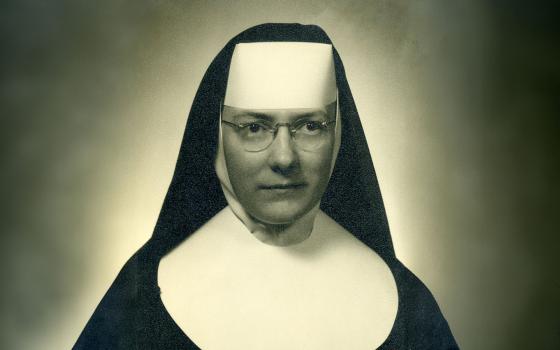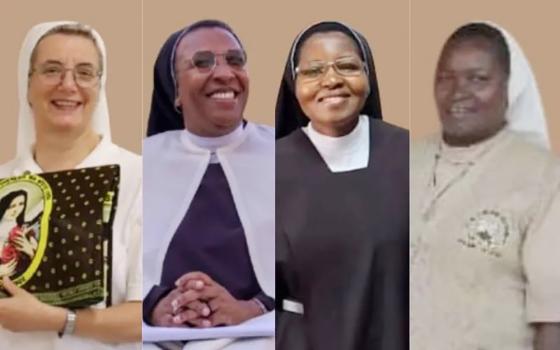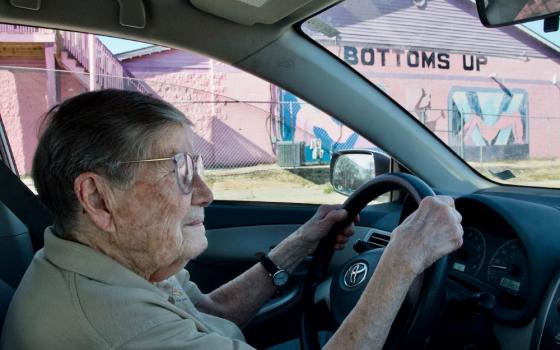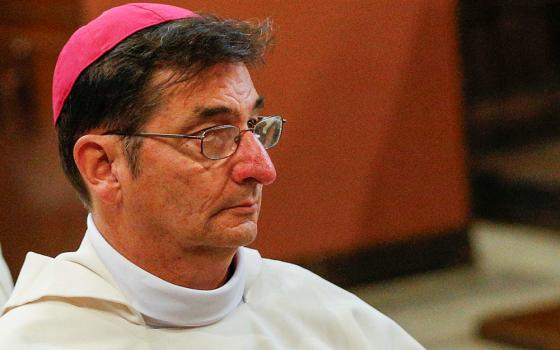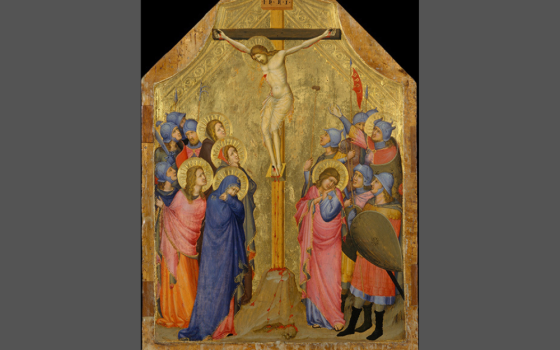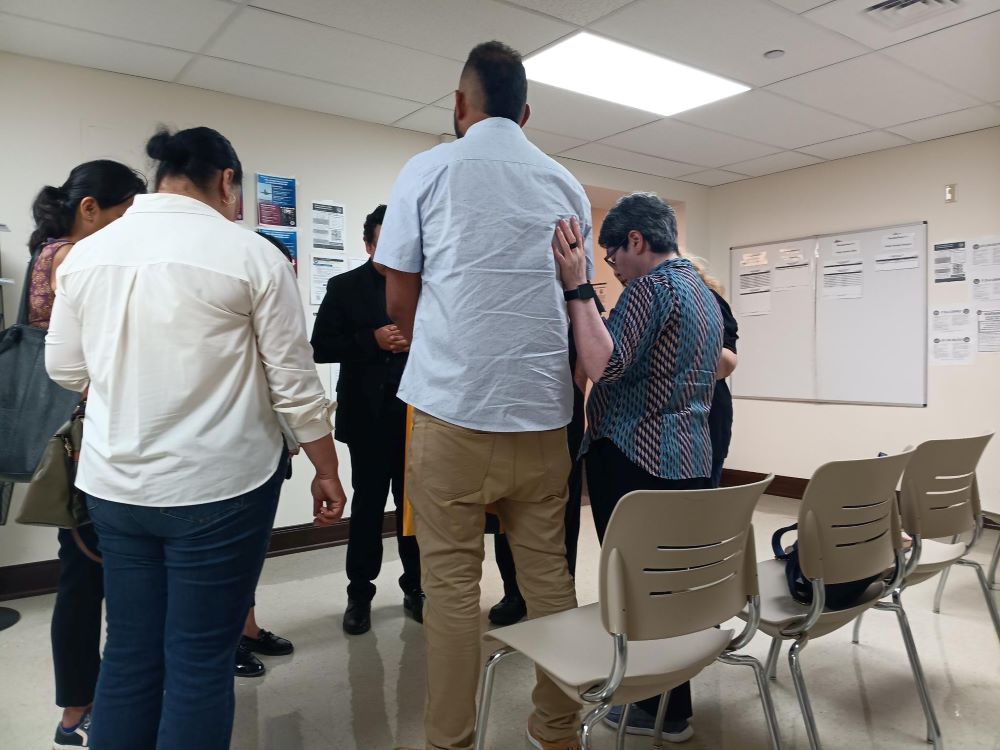
Sr. Leticia Gutiérrez Valderrama, right, and others from a migrant ministry group, prays with a man in a room at an immigration court in El Paso June 25. Gutiérrez, a Scalabrinian sister, has been leading the diocese's efforts in El Paso's immigration court, comforting and helping women, children and men facing detention and deportation. (Courtesy of Hope Border Institute)
Since May, when federal agents began arriving at U.S. immigration courts, seeking to detain or deport migrants, Sr. Leticia Gutiérrez Valderrama has been with them, too, with the intent of accompanying women, children, and men facing uncertainty and fear.
In the hallways of the courts in El Paso, Texas, the Scalabrinian sister has helped countless individuals and families prepare for the most feared events these days for migrants in the United States: being detained or deported.
The court is a place where the missionary sister, who has accompanied migrants in Mexico, Spain, and now the United States, did not expect to be. But a few months ago, she began seeing the need as she started coordinating a new ministry in the border diocese. El Paso Bishop Mark Seitz saw the need for "a response from the church, a diocesan team that will represent the ministry with migrants," Gutiérrez told Global Sisters Report.
That response included visits to parishes and homes in El Paso, where migrants found themselves facing limitations. Then-U.S. President Joe Biden, who at the end of his term increasingly restricted entry into the country. But in May, as detentions increased in immigration courts under the Donald Trump administration, Gutierrez said she saw the need to reorganize the ministry and find a different way to help.
Instead of running a welcoming ministry, she found herself looking at how to help people facing deportation leave the country with dignity.
'Everyone is susceptible to being detained, because there really is no parameter for saying [who] will be detained.'
—Sr. Leticia Gutiérrez Valderrama
"The first thing that comes to mind when I think about Sr. Leticia and her ministry is the amazing adaptability that she's shown," Seitz told GSR. "Our situation has changed drastically over the last year. … There came a point when we realized that some pretty dramatic events were taking place in the immigration courts in El Paso."
It is unclear how many people have been detained nationwide after court appearances, but the Asylum Seeker Advocacy Project, which monitors government activities relevant to migrants, says on its website that eyewitness accounts show that detentions have decreased in some courts across the country since August, but continue in others.
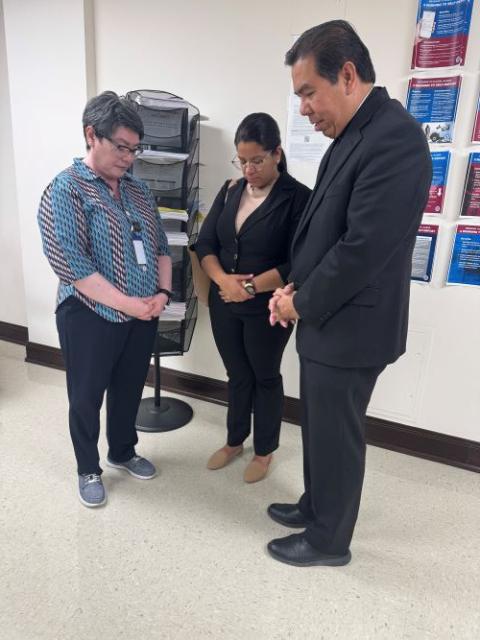
Sr. Leticia Gutiérrez Valderrama, left, joins El Paso Auxiliary Bishop Anthony Celino, as they pray with a woman in a room at an immigration court in El Paso June 25. (Courtesy of Hope Border Institute)
At the end of June, Bishop Michael Pham of San Diego, who came to the U.S. as a child refugee from Vietnam in 1981, decided to spend World Refugee Day with priests from his diocese accompanying people to an immigration court in California. The visit made headlines when immigration agents dispersed after seeing him in the hallways.
The El Paso bishop did the same, accompanying migrants as well as the sister, in court.
"It was very disturbing and moving," Seitz said of the experience of seeing people leave court after a positive experience with the judge — only to be detained by immigration agents upon exiting. But Gutiérrez handled the situation with great compassion, he said.
"She has to give them some really bad news most of the time, but she is so calm and gentle in her manner and so caring that it helps people," Seitz said. "She has to explain to them, 'They are going to take away your phone and all your possessions that you have on you. You have to memorize a phone number [of a family member or friend], or write it down on your arm or leg so that you'll be able, when you have a chance to make your one phone call, to call that number and inform your people what's happening to you.' "
Bishop Mark Seitz of El Paso, Texas, right; Archbishop Gustavo García-Siller of San Antonio; and Bishop Peter Baldacchino of Las Cruces, N.M., lead a march in El Paso March 24 against mass deportations by the U.S. government. (OSV News/Bob Roller)
Volunteers who help the ministry are organized into two groups, "observers and companions," Gutiérrez said.
"Observers are the people who enter the courtroom, take notes on the decisions made by the judge and the prosecutor, and the ruling that is handed down, and then share this information with an organization so that it can have an impact," she said.
The companions remain with the migrants, listen to them, sometimes pray and help them prepare for the possibility of deportation or detention. The government argues that U.S. Immigration and Customs Enforcement (ICE) agents have not been detaining people as they leave court. Gutierrez insists that "what is said in the media is real."
"Everyone is susceptible to being detained, because there really is no parameter for saying [who] will be detained," she said. "It's very aggressive and grotesque for people" to be taken away in a certain manner by masked individuals, Gutiérrez added.
Despite the emotions, there is much to do before migrants enter the courtroom. Gutiérrez and her team advise them to send photos of their documents to family members by phone and leave their car keys with volunteers in case immigration takes them away. They also teach the families of detainees how to use ICE's online locator to find the whereabouts of their loved ones who have been detained.
Seitz, who until November is the chairman of the U.S. Conference of Catholic Bishops' Committee on Migration, said several dioceses across the country are helping affected migrants in similar ways. Gutiérrez said that, despite not being able to stop deportations or detentions, people can offer support.
"Above all, mothers or wives are left worrying about whether their children are OK, whether they will be transferred to El Salvador or Guantanamo, to those dangerous countries," she said. "And there is follow-up when the person is detained and leaves children behind, and there is that separation of the family. We have to figure out how we can accompany the family as much as possible, how we can involve the parish in case there are any basic needs to be met, if the parish can provide at least the bare minimum, because the separation of families continues to happen. Little is said about it, but it is a reality."
Families are often left crying, anxious, have questions and regret not having said goodbye, Gutiérrez said.
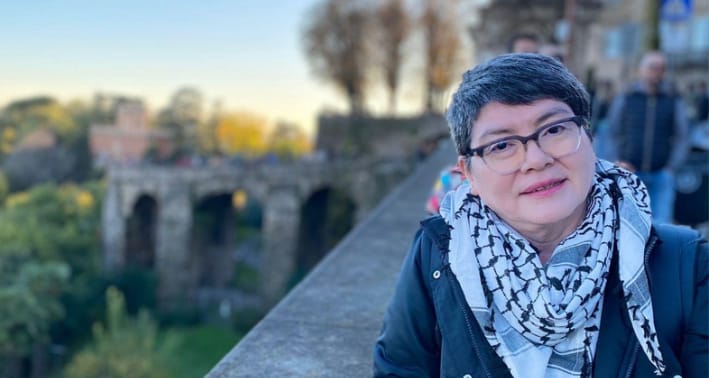
Scalabrinian Sr. Leticia Gutiérrez Valderrama has shifted her ministry from welcoming migrants to accompanying them in the hallways of the courts in El Paso, Texas, and preparing them for being detained or deported. (Courtesy of Leticia Gutiérrez Valderrama)
Seitz sees two major concerns: the separation of families and the actions of ICE.
"It's shocking to me that the ICE agents seem to feel under no obligation to follow the decisions of the immigration courts that have, in the past, had authority in these cases," he said. "But now it seems that ICE considers that they have a greater authority, and they're going to pursue it in the way that they see fit."
Gutiérrez said that it is often difficult to see people's suffering, so she clings to faith in those moments.
"It's not only my pastoral work, but my apostolate, my mission, and, above all, I recognize that when I accompany someone, when I defend someone, when I am with them, I am with the Lord Jesus himself, present in each and every one of my sisters and brothers, the Lord Jesus is there," she said. "That is a really great, really strong force for me."
Advertisement

